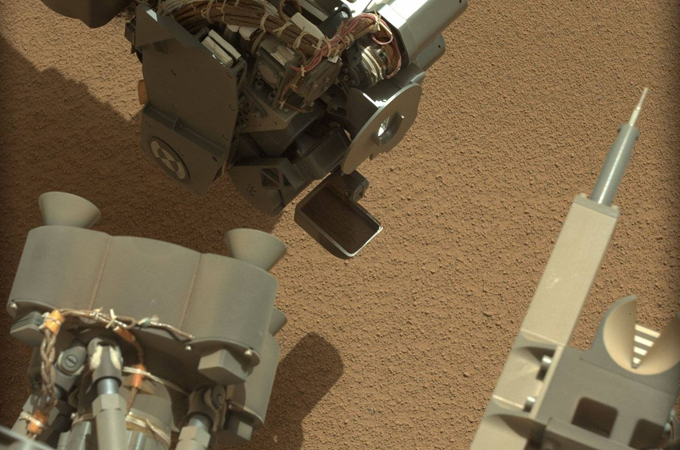 |
| Curiosity scoops up an alien civilization |
But is that really the case? First, we are challenged by what we are trying to detect, and how we are able to try to detect it. This weeks frantic mass-media response to a particular Curiosity scientist's excitement over the current soil analysis research reminded me of nothing so much as the year long tug-o-war over ALH84001, the Martian meteorite that might or might not have evidence of fossilized microbes less than 100 nanometers in size, and which shows evidence of polycyclic aromatic hydrocarbons which may or may not be biogenic in origin and may or may not be the result of contact with the earth's atmosphere. The assumption that Curiosity might have discovered organic molecules on Mars was predictably greeted with mass media questions that boiled down to "have we discovered life on Mars?" Their difficulty, as always, is to try and understand the nuance of the "necessary but not sufficient" condition. Life would require organic compounds, but organic compounds do not require life.
So we are confronted by the challenge of determining the threshold for declaring some discovery an actual extra-terrestrial life form. What we are seeking isn't even just cellular, microbial life on another planet, but very likely long-extinct cellular microbial life. So perhaps this would be a good moment to take a giant step back and re-think the entire endeavor in a top-down fashion.
Given what we know from studying earth, life seems universally common and almost cartoonishly robust. In spite of eons of periodic global disasters and mass extinction events, life always rebounded to cover the planet, from ice sheet to tropics, from the ocean depths to the mountain tops. With that understanding of life, it seems inevitable that we will eventually determine these simple microbial life forms also have existed on other planets and moons in our Solar System. And from that relatively safe assumption we can comfortably conclude that the universe literally teems with life, some small fraction of it evolving into a diverse ecosystem that includes larger, more complex creatures and even, in some cases, intelligent species. And therein lies the key question.
If and when we discover some single cell nano-bacteria fossil on Mars or a simple algae drifting in the oceans of Europa, will this really be the profound, civilization-shaking discovery conventional wisdom has come to expect it to be? Or will it be simply affirming something we already, on some level, know to be true? Will it be a discovery that 'changes everything' or one that is scientifically interesting but ultimately meaningless in the way we perceive the universe? Indeed, I think as we become more capable of exploring our own Solar System even as we come to grips with the fact that we will never visit planets orbiting other stars, it's a very good time to recalibrate our expectations in this realm. In the case of the extra-terrestrial creatures we're likely to meet, the introductions will be mediated by an electron microscope, and it may very well be mummies we're meeting rather than living creatures.
Me, I'd begin to get excited by something like a fish, and I'd be positively bowled over by something of the size and intelligence of a dog. But there's really no world within our reach that can support that kind of complex evolutionary development. Bacteria? I think that's a foregone conclusion, on any planet or moon that exists within the temperature and energy thresholds that might possibly support it. All this hyperventilating over the possibility of organic precursors to life on Mars is simply setting us up for another giant misunderstanding-fueled anticlimax, like the Y2K outcome but orders of magnitude worse. The profound moment of discover will come not from a space probe at all, but from the receipt of radio frequency signals from an intelligent culture's equivalent of Television. That will be simultaneously wildly exciting and deeply frustrating, because we will know they are there without being able to talk to them. But we won't learn anything important about ourselves from extraterrestrial bacteria...
...
I think we'll end "intelligent life" here on earth before we find it anywhere else in the universe.
ReplyDelete~
I think you're certainly right. I often speak of my fascination with the Drake Equation, particularly the last variable which is the lifespan of an intelligent species. Which calls into question the proximity of planets with intelligent life not only in space but on a galactic timescale...
ReplyDeleteYou know I was thinking about something else to add, but I'm stuck with a branch...Cliff Branch!
ReplyDeleteI saw Super Bowl XVIII.
Wasn't so happy...
~
Looks like my order of Romulan Ale got mis-delivered.
ReplyDeleteI can't find an email for Universal Parcel Service, though.
It's on Mars.
ReplyDeleteCuriosity has developed an unanticipated case of the hiccups...
You can only be curious so long before you need a good strong drink.
ReplyDelete